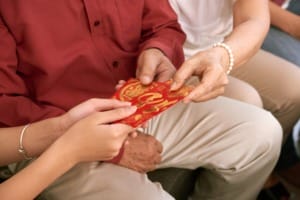A time for reunions and joyful celebrations, the Lunar New Year sees many people across Malaysia and the world travel far and wide to visit their parents and elders, just to commemorate this once-in-a-year festivity. But did you know that when observing the first day of Chinese New Year, not everyone should return home to see their families?
According to traditional customs, as explained on cultural website Chinese Highlights, married daughters are not allowed to visit her parents’ house on the first day of Chinese New Year. Such an action is said to bring bad luck on the daughter’s family, particularly her parents, potentially bringing them economic hardship and poverty.
A rather hard and shocking pill to swallow, isn’t it? But unfortunately for married daughters, there is a bigger reason behind why such a “tradition” is carried out.

“Belonging” to her husband’s family
In an article writeup by Medium, traditional patriarchal Chinese communities centre reunion dinners around male elders, including male descendants and their wives who marry into these families. These reunion dinners, however, do not include daughters or even granddaughters who have married out of their families.
Instead, a woman’s professed family from the time she gets married is actually that of her husband’s, therefore requiring these wives to instead have a reunion dinner with the people who are considered her “new family”. This acts not only as a way for a wife to show filial support to her husband’s parents, but also demonstrating a respect towards familial hierarchical order.

Image for illustration purposes only.
More traditional Chinese beliefs account that married woman who want to visit their own families on the first day of the Lunar New Year is done to escape from their troubled marriage.
Can married daughters see their parents… like… at all?
Relating to cultural beliefs, married daughters are allowed to visit their family on the second day of Chinese New Year. On this day, it is said that married women can “rid themselves” of their role as daughters-in-laws, and find time to spend with their parents. Nevertheless, there are still some practices that wives apparently need to abide by before the visit.

Image for illustration purposes only.
An article on South China Morning Post elaborated on the fact that daughters must return to their homes by bringing an even numbered of gifts to her family, as an odd number may be considered ominous. Additionally, they should also provide ang pows to all non-married family members, to demonstrate their financial security and reflect their new life in the husband’s family.

Image for illustration purposes only.
A fulfilment of traditional duties or a grossly unbalanced practice?
As we move further into the 21st century, it’s safe to say that such a practice may not be as common as one may think. Aside from travel burdens one may face when needing to visit either side of a family, an argument for deciding where one should go can even be made on financial reasons or downright convenience.
But the ultimate question lies as to whether this form of tradition should be practiced in the 2020’s and beyond. The underlying theme of imbalance will always come up when deciding why the husband’s family is given priority for what should be a homecoming celebration – for all devotees.

Image for illustration purposes only.
Here’s what married Malaysian women had to say about it
Taking this practice one step further, WORLD OF BUZZ recently spoke to a number of married women who celebrate Chinese New Year, and to see if this is a custom they abide by or not.
30-year-old Julie, who does not dub herself as a superstitious person, said that the yearly decision is made based on who is available for the celebration on day one of Chinese New Year. According to Julie, if her husband’s family is unable to gather on the first day, they’d simply travel to her side instead.
“I honestly find the practice quite odd and unfair. Why can’t you take turns or something? This year we can spend day one with his family, next year day one with my family, and so on, so forth,” she said to WORLD OF BUZZ.

Image for illustration purposes only.
On the flip-side of things, 28-year-old newlywed Sheng Xi told WORLD OF BUZZ that she firmly rejects the outdated rule and would never abide to something that archaic.
“I love my new family, don’t get me wrong – but to think that I will forever not get to see my parents on the first day of Chinese New Year is very backwards and actually harmful,” she said.
Embellishing on their plans, Sheng Xi stated that she and her husband will be having lunch on the first day with her in-laws, but dinner with her own parents, to ensure they each get to see their family on this auspicious day.

In any circumstance, may we all remember that festive seasons of every kind are meant to be shared with the people we love the most in this world, family or not. The most important thing each person should abide by, is spending the holiday with what makes them the happiest.

Image for illustration purposes only.
What do you think of this ancient tradition? Do you think it should still be followed? Let us know!
Also read: “The Great Race” – Here’s Why Every Chinese New Year is Represented by 1 of 12 Different Animals









































